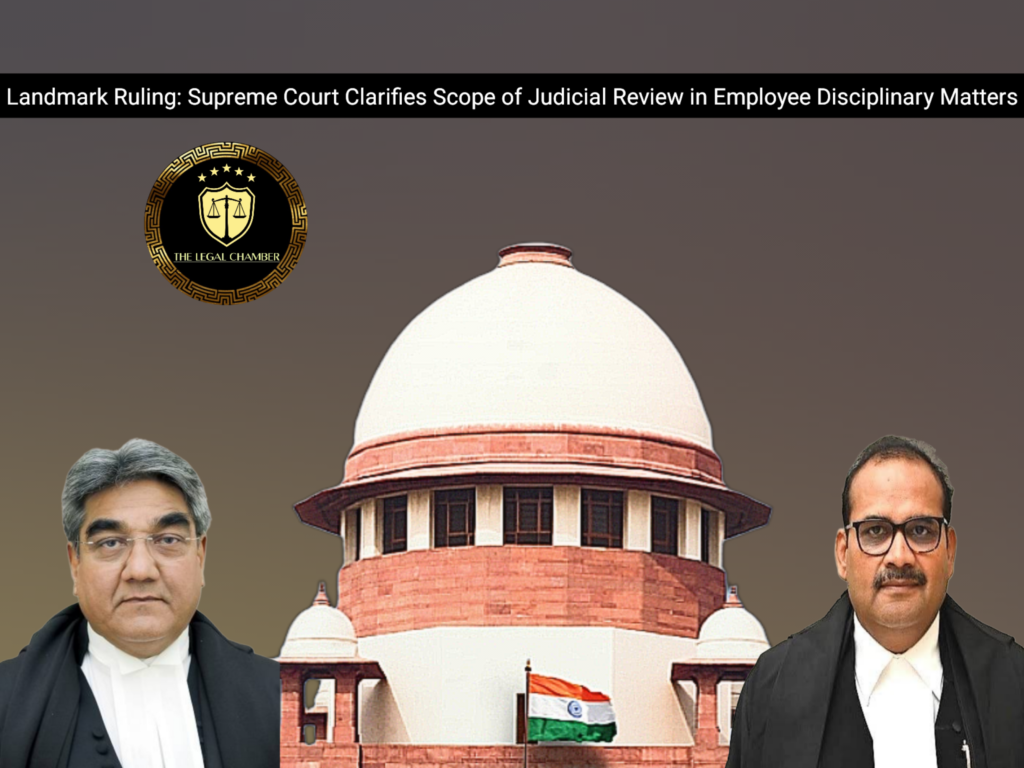
This Supreme Court judgment reiterates the limited scope of judicial review in disciplinary proceedings. Courts cannot act as appellate authorities to re-appreciate evidence. The standard of proof is preponderance of probability, not strict evidence rules. Interference is only permissible if the finding is perverse, based on no evidence, or violates natural justice. The Tribunal exceeded its jurisdiction under Section 11-A of the Industrial Disputes Act by doing so.
Facts Of The Case:
The respondent, Ganganarasimhaiah, was a Sub-Staff employee at Canara Bank’s V.G. Doddi branch. An investigation revealed serious irregularities, including unauthorized loans and tampering with bank records. Specifically, it was alleged that he facilitated loans for his wife and father without the mandatory concurrence from the controlling office. Further, he was charged with making unauthorized debit entries in a customer’s savings account to conceal a temporary overdraft, subsequently altering the bank’s balancing book and control registers to hide these transactions. Following a domestic enquiry where these charges were proven, the bank’s Disciplinary Authority imposed the punishment of compulsory retirement. The respondent challenged this punishment before the Central Government Industrial Tribunal. Although the Tribunal initially held the enquiry was fair and proper, it later set aside the punishment in its final award, ordering reinstatement without back wages, a decision upheld by the High Court. The bank’s appeal to the Supreme Court contested this interference, arguing the courts had overstepped their limited judicial review jurisdiction.
Procedural History:
The procedural history of this case began with the respondent being compulsorily retired by the Canara Bank’s Disciplinary Authority after a domestic enquiry found him guilty of misconduct. The respondent then raised an industrial dispute, which was referred to the Central Government Industrial Tribunal. The Tribunal first decided a preliminary issue, holding that the domestic enquiry was fair and proper. However, in its final award, the Tribunal set aside the punishment of compulsory retirement and ordered the respondent’s reinstatement without back wages, reasoning that the charges were not conclusively proven. The bank challenged this award by filing a writ petition before the High Court of Karnataka, which dismissed the petition and upheld the Tribunal’s award. The bank subsequently appealed to the Supreme Court by way of a special leave petition, which culminated in the present judgment, allowing the bank’s appeal and restoring the punishment imposed by the Disciplinary Authority.
READ ALSO:Supreme Court Says Failure in Treatment Isn’t Always Negligence :A Landmark Ruling for Doctors
Court Observation:
The Supreme Court observed that the Tribunal and the High Court had exceeded their jurisdiction in judicial review. It reiterated that courts cannot act as appellate authorities to re-appreciate evidence in disciplinary proceedings, where the standard of proof is preponderance of probability, not beyond reasonable doubt. The Court found that the Tribunal erroneously applied strict rules of evidence, demanding conclusive proof that the respondent was the “author of the entries,” despite concurrently noting it was “highly possible” the manager committed irregularities at his instance. It held that the findings of the Enquiry and Disciplinary Authorities were based on evidence, including admissions and handwriting identification by experienced bank officers, and were not perverse. The Court emphasized that acts compromising integrity in the banking sector justify a loss of confidence, making the punishment of compulsory retirement neither harsh nor disproportionate.
Final Decision & Judgement:
The Supreme Court allowed the bank’s appeal, setting aside the orders of the Tribunal and the High Court. The Court restored the punishment of compulsory retirement imposed by the Disciplinary Authority, thereby overturning the order of reinstatement. It held that the judicial forums below had erroneously re-appreciated the evidence, which is beyond the permissible scope of judicial review in disciplinary matters. The Court affirmed that the findings of the domestic enquiry were based on evidence and were not perverse. Consequently, the respondent employee is not reinstated but, as he was compulsorily retired and not dismissed, he remains entitled to receive gratuity and other pensionary benefits in accordance with the law.
Case Details:
Case Title: The General Manager (P), Canara Bank vs. Ganganarasimhaiah Appeal Number: (Arising out of Special Leave Petition (C) No. 20343 of 2022) Date of Judgement: 9th September, 2025 Judges/Justices Name: Justice J.K. Maheshwari and Justice Vijay Bishnoi